
Photo taken on June 7, 2016 shows the Mount Muztagata on Pamirs Plateau, northwest China's Xinjiang Uygur Autonomous Region. Xinhua/Zhao Ge)
URUMQI, June 16 (Xinhua) -- In China's remote western Pamirs, wealth is measured not in money or houses, but in sheep and cattle.
Every year, the herdsmen move their livestock between summer and winter pastures to "maintain and increase the value of assets."
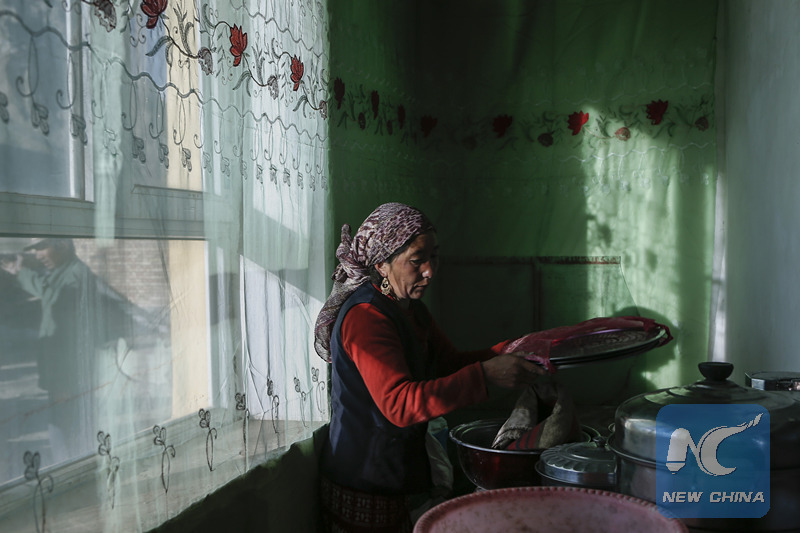
A woman of Kirgiz ethnic group prepares at home for moving to the summer pasture in Atjiayili village inside the Wakhan Corridor in northwest China's Xinjiang Uygur Autonomous Region, June 6, 2016. (Xinhua/Zhao Ge)
Kirgiz herdsman Sulayman, 26, lives in Atjiayili Village, the closest Chinese village to the border with Afghanistan, in the Wakhan Corridor, an area with an average altitude over 4,000 meters.
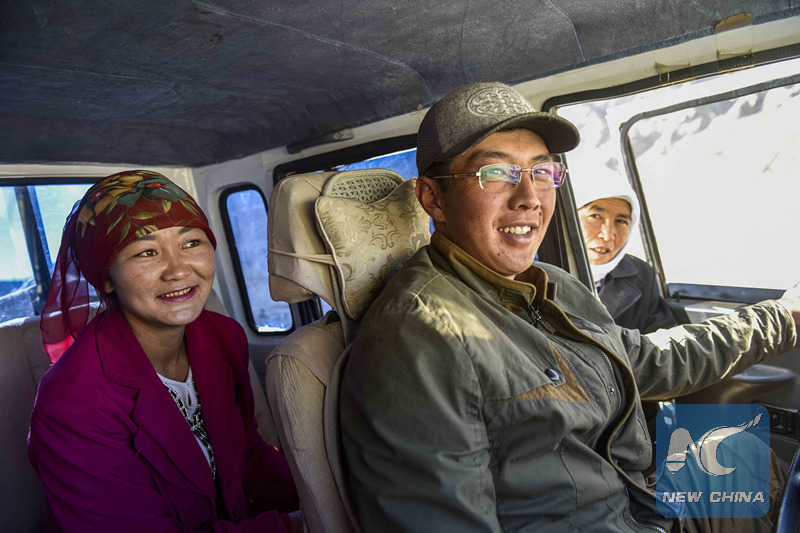
Sulayman of Kirgiz ethnic group and her aunt, 31-year-old Gulqal, rest in the car while on their way to the richer summer pasture in Atjiayili village inside the Wakhan Corridor in northwest China's Xinjiang Uygur Autonomous Region, June 6, 2016. (Xinhua/Zhao Ge)
He is going to move 200 sheep to a summer pasture in a valley 25 kilometers away with his family.
The transfer is divided into two groups. One is led by Sulayman, who drives a jeep carrying his mother Aterhan and aunt Gulqal. They will arrive ahead of the livestock so they can set up yurt, prepare food and build the sheepfold.
Sulayman says they must also put up a smaller sheepfold for the lambs. "The lambs have to be separated with their mothers in the evening or they won't have enough milk in the daytime."

Frontier guards help moving livestocks to a summer pasture in Tajik Autonomous County of Taxkorgan, northwest China's Xinjiang Uygur Autonomous Region, June 6, 2016. Frontier guards helped Kirgiz nomads move to their summer pasture over the border areas of some 4,000 meters above the sea level here in Xinjiang. (Xinhua/Zhao Ge)
The long distance and the high altitude make the transfer of livestock arduous, but the young, weak and old animals are well cared for. Three lambs less than two months old are also taken in the jeep.
In the past, horses were the main form of transport for the herdsmen and their belongings, but the jeeps make the journey easier and quicker, says Sulayman.
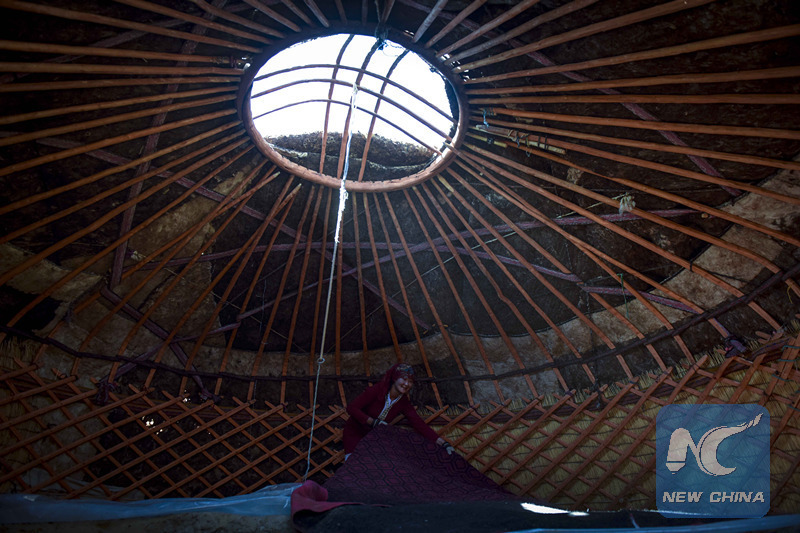
Gulqal prepares her bedding in her yurt, a new home for her on the summer pasture inside the Wakhan Corridor in northwest China's Xinjiang Uygur Autonomous Region, June 6, 2016. (Xinhua/Zhao Ge)
On arrival, Sulayman and the two women set up beds and stoves, and then Aterhan makes lunch - yak meat with potatoes, and naan, a staple food of Xinjiang, and a nutritious brick tea.
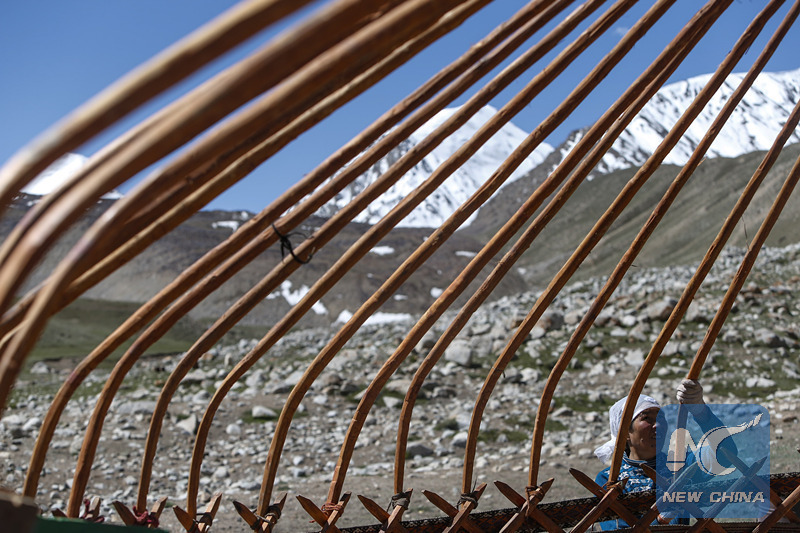
Aterhan sets up a movable yurt, her new home at the summer pasture inside the Wakhan Corridor, in northwest China's Xinjiang Uygur Autonomous Region, June 6, 2016. (Xinhua/Zhao Ge)
The other group - uncle Qurbaneli and sister Huryet - is leading 200 sheep. Huryet is taking part in the transfer for the first time. She insists on walking.
At 5:30 p.m., nine hours after they set off, the sheep come into view of the encampment. Sulayman greets his uncle and sister, and counts the sheep - all are present. Sulayman smiles on seeing the sheep in the sheepfold.
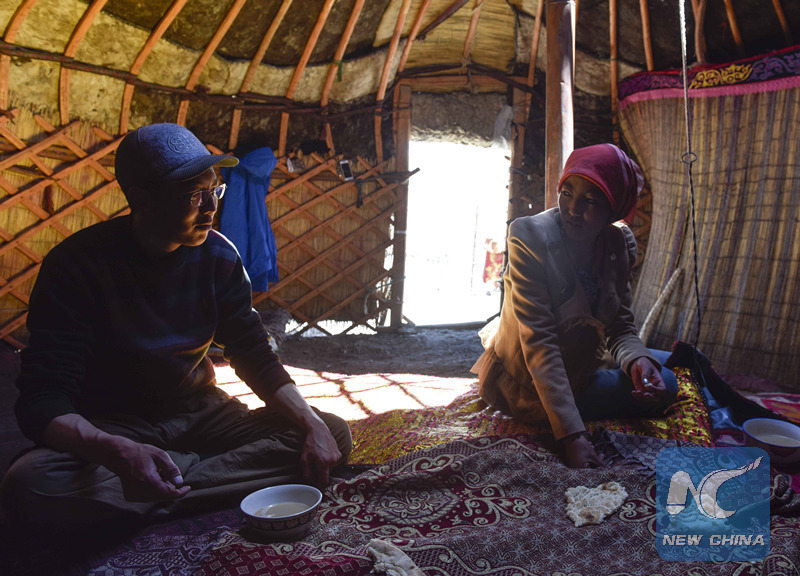
Sulayman and his sister Huryet take a rest in a yurt, their newly-set home, after they arrival at the summer pasture inside the Wakhan Corridor in northwest China's Xinjiang Uygur Autonomous Region, June 6, 2016. (Xinhua/Zhao Ge)
From now till October, Sulayman and his family will graze sheep on the pasture and help protect the border. Although they are not professional border guards, they can observe movements there.
May and June are the busiest time in the Wakhan Corridor as herdsmen in Xinjiang Uygur Autonomous Region take their livestock to summer pasture at higher altitudes.
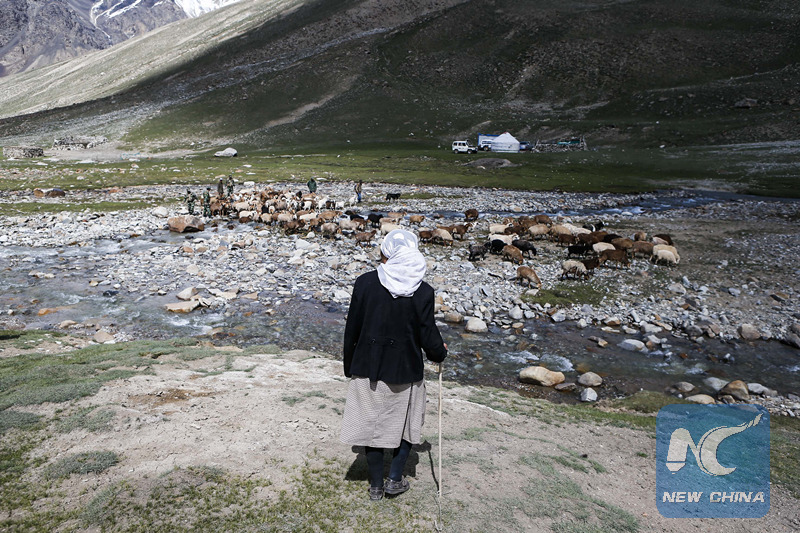
Aterhan stands on a hill looking at her sheep arriving at the summer pasture inside the Wakhan Corridor in northwest China's Xinjiang Uygur Autonomous Region, June 6, 2016. (Xinhua/Zhao Ge)
Nomadic herdsmen spend their lives following the water and pasture. The transfer provides cattle and sheep abundant food and enables the grassland to renew itself.
It is near dusk when Sulayman finishes work. He estimates his earnings for the year. "I get a subsidy for help protecting the border. Taking the subsidies and sales of sheep into account, I could earn more than 20,000 yuan (3,036 U.S. dollars) for the year," he says.
"As long as the border area is stable, our life is settled."
FROM OUR OWN CORRESPONDENT
Zhao Ge, a Xinhua correspondent in Xinjiang, accompanied Sulayman family during the livestock transfer.
He said the transfer was small compared with some that take several days.
Although they traveled just 25 kilometers, it was not easy for the herdsmen due to the high altitude, bumpy roads and "naughty" sheep.

Photo taken on June 6, 2016 shows the summer pasture for nomads inside the Wakhan Corridor in northwest China's Xinjiang Uygur Autonomous Region. (Xinhua/Zhao Ge)
Livestock transfers are common for nomadic herdsmen, but following water and grass means it is difficult for them to access medical care, education and other services.
Some herdsmen choose to settle down and some maintain the life lived by their ancestors over thousands of years.
The experience made Zhao even more aware of how important national stability is for the people. Sulayman, his father and his grandfather belong to a group of very important people. They are not border police guards, but they help to keep an eye on the border.
They report to the police anything they think is unusual or suspicious along the border of China and Afghanistan.
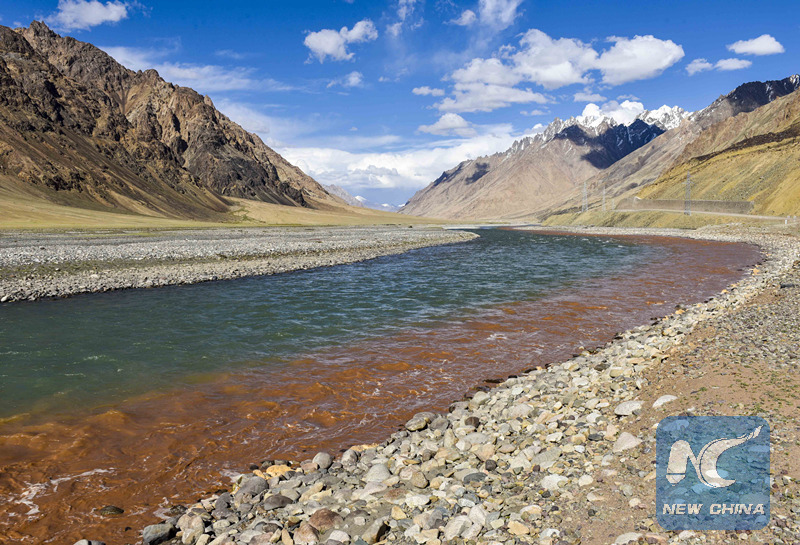
Photo taken on June 4, 2016 shows a river merged by two streams of different colors inside the Wakhan Corridor in northwest China's Xinjiang Uygur Autonomous Region. (Xinhua/Zhao Ge)
At the other end of the Wakhan Corridor, Afghanistan is in chaos - two very different worlds separated by the border.

